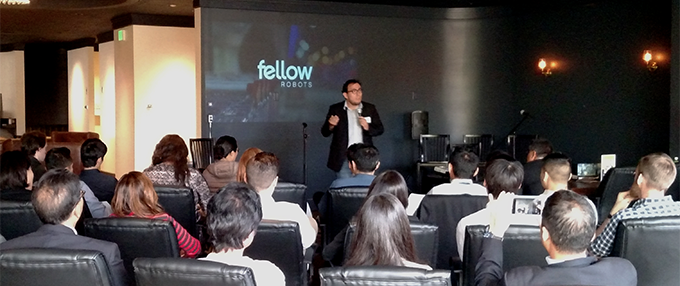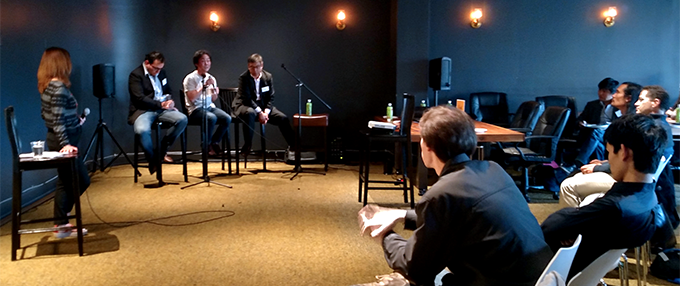[Press Release] East Bay Event Highlights Opportunities in Japan's IoT & Robotics Markets
Jun 01, 2016

OAKLAND, CA—Nearly 70 East Bay business executives and entrepreneurs attended Wednesday night’s business seminar, which featured several guest speakers discussing the state of Japan’s tech industry. The presentations focused on Japan’s IoT and robotics industries, with emphasis on market opportunities in each.
The evening lineup saw three speakers deliver personal insights on Japan’s tech industry: Eisuke Tsuyuzaki, a JETRO Advisor and former CTO & VP of Corporate Development at Panasonic North America; Marco Mascorro, Co-founder and CEO of Fellow Robots, a company that specializes in the development and manufacture of retail service robots; and Masanari Arai, Co-founder and CEO of Kii Corporation, a company that provides mobile backend as a service in addition to distribution partnerships and venture capital.
Mr. Tsuyuzaki addressed the current development of Japan’s IoT market. Japan is rapidly integrating IoT platforms into the daily lives of its civilians. Since 2010, Japan has established four smart cities; these cities are built on an IoT platform and are designed to be stable, fiscally and environmentally responsible, and disaster-management ready. Japan ultimately hopes to use these cities as models for transforming its larger metropolitan areas.
In addition to its smart cities, Japan is also working to prepare for the future of IoT in other ways. In 2011, the Tohoku Earthquake and Tsunami destroyed much of Northeast Japan’s infrastructure and economy. In the process of rebuilding the area, the government has taken steps to encourage IoT integration and use, both to build a stronger regional economy and also boost disaster-preparedness.
As IoT plays an increasingly important role in the every-day lives of Japanese citizens, new business opportunities are emerging for foreign companies seeking to establish a foothold in the market.

Mr. Tsuyuzaki’s presentation was followed by Mr. Mascorro, who discussed the value of robots in retail settings. Robots are beginning to find their place in the retail community. Companies who utilize retail robots to help serve customers can collect data on consumer trends and interests, including things like popular items, common questions, and issues with product organization.
Mr. Mascorro noted that the opportunities are strong in both the North America and Japan market, but there is more openness to robot integration in Japan than there is in the U.S. with regards to daily activities.
“Hollywood got ahold of robots and made things like Terminator, I am Legend, and Ex Machina. Although it isn’t everything, there’s a clear level of apprehension there about the future of man and robots [for Americans] that hasn’t really hit Japan.”
Masanari Arai, the evening’s final presenter, highlighted the practical aspects of building a presence in Japan.
“Japan can be a dangerous place for businesses if [companies] don’t go in prepared to spend money and time to get things right. Companies who try to skip this will pay for it in the long run,” he started.
One of the most important things to understand about the Japan market is that Japanese consumers are very conscious about quality. They have high expectations for both the purchase process and product use, and are quick to abandon a new company that doesn’t excel at both. He highlighted an example in which a Japanese consumer returned a product because the box in which it was delivered was damaged. Companies who wish to succeed in Japan need to improve and perfect every part of their business service in order to convert buyers into loyal clients.
Mr. Arai also touched on the need for cultural awareness to succeed in Japan. In East Japan, he explained, companies don’t negotiate. “The price you give them, they either take it or don’t. But in West Japan, there is a firm belief that everything should be negotiated. Whatever price you present them, they’re going to work down from there.” Companies should recognize these differences and use them to their advantage so they don’t accidentally cut themselves out of a market or sell below actual product value.
To do this, Mr. Arai stressed finding a Japanese business partner. For companies who are entering the market with no previous experience of doing business in Japan, the best way to work within the culture expectations is to find someone who already knows them. Use that and then build the business from there as knowledge grows.
The event concluded with a Q&A session for the presenters, followed by time for networking. The event was hosted by the Japan External Trade Organization in conjunction with 2.Oakland and The Port Workspaces, who provided the event space.






